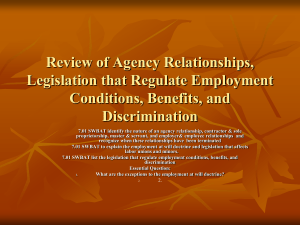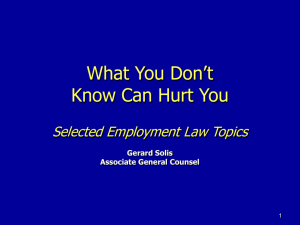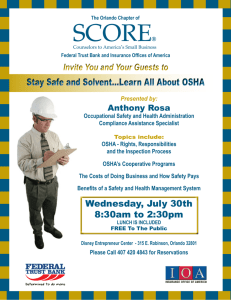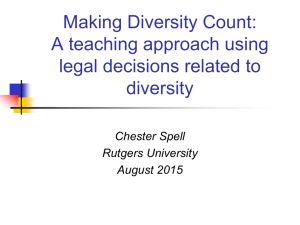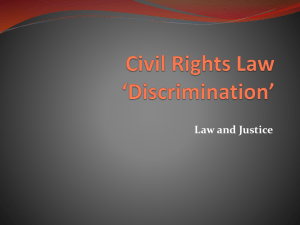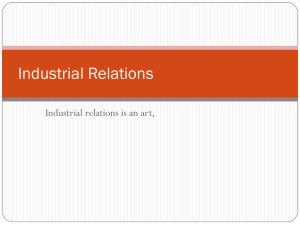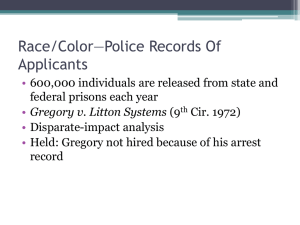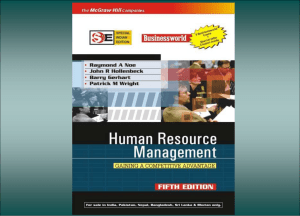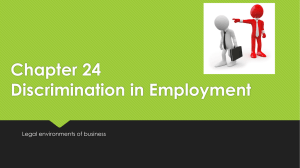International Law - The University of Texas at Dallas
advertisement
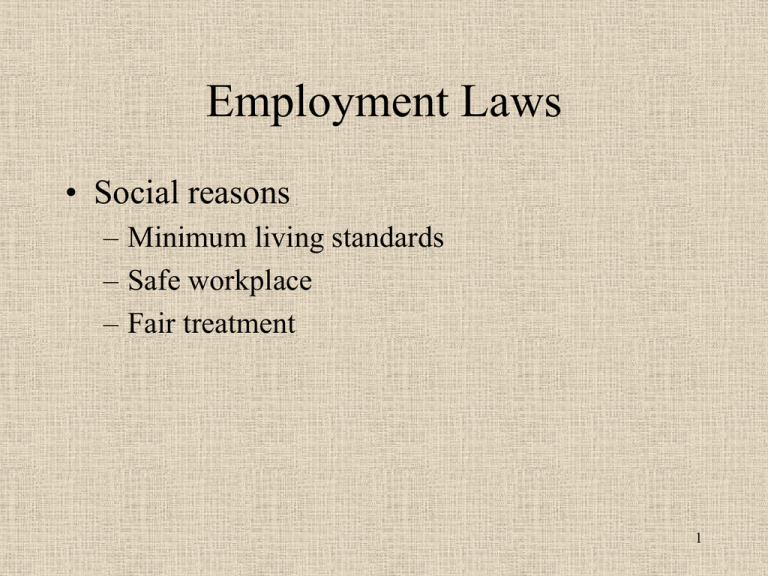
Employment Laws • Social reasons – Minimum living standards – Safe workplace – Fair treatment 1 Fair Labor Standards Act • All businesses that affect interstate commerce • Exception – business whose only regular employees are owner & family • Established minimum wage – Exception – learners, apprentices, handicapped workers • Hours after 40 per week: time and a half – No limits on hours – No right to refuse overtime 2 Fair Labor Standards Act • Exempt employees (from overtime) – – – – – – – – Professionals Executives/managers Those who use discretion & judgment Teachers Salespeople Casual babysitters Farm workers Some specific industries 3 Fair Labor Standards Act • Child Labor – – – – 18+: any job 16-17: “nonhazardous jobs” & unlimited hours 14-15: “limited hours Exemptions • Child actors: exempt except earnings must be put in trust • Farm work • Work-study programs 4 Fair Labor Standards Act • Enforcement – – – – – Employee complaints Labor Department investigations Record keeping requirements Civil and criminal penalties Corporations & officers liable 5 Fair Labor Standards Act • Equal Pay Act of 1963 – Disparate pay may only be based on merit and seniority – Jobs do not have to be identical • • • • Equal effort Equal skill Equal responsibility Similar working conditions – Includes exempt employees – Defenses • • • • Seniority Merit Piecework Any factor other than sex 6 Social Security • 1935 Act – minimal retirement income for workers in industry & commerce • 1939 amendment added dependents • 1957 disability payments/workers in households, farms, military, clergy, state & local government, self-employed • 1965 Medicare • 1973 amended Medicare 7 Social Security • • • • • • • Funded equally by employer and employee Tax rate has risen Maximum salary has risen COLA 1984 – federal workers Benefits taxable Current retirees draw $4 for every $1 paid 8 Regulations for Retirement Plans • ERISA - 1974 – Medical, retirement, income-deferral plans – Reporting • Annual reports • Annual statements to employees • Accounting as current expenses – – – – Fiduciary duties Investment restrictions Pension Benefit Guaranty Corporation Vesting 9 Family & Medical Leave Act of 1993 • Social issues – Women in the work force – Single-parent families • • • • 12 weeks unpaid leave w/health coverage Return to equivalent job Employers w/50 or more employees Employees over 1 year service 10 OSHA • Businesses with 1 or more employees • OSHA may award temporary or permanent variances • Prioritized inspections – – – – – Conditions that could result in death Fatal accident sites Employee complaints Hazardous industries Random inspections 11 OSHA • Whirlpool Corp. v. Marshall – Employees may refuse to work in unsafe conditions • Pre-emptive counseling • Search warrants required • Penalties – Fines – Prison • Drug & alcohol screening • 50% of states administer OSHA 12 OSHA • Criticisms – Nature of regulations • Vague: “all places of employment…kept clean & orderly” • Trivial: “irregularities in wood used for ladders” – Cost of compliance – Attitude of OSHA employees – No relation to safety: “no ice in drinking water” 13 Unemployment Compensation • State laws – Administered and taxed by state – Benefits vary • Employers – One or more employees/20 or more weeks per year – Wages greater than $1500 – Exempt businesses • • • • Educational, religious or charitable organizations Farm labor Family members Federal & state government • Payroll tax paid by employers/depends on experience 14 Unemployment Compensation • Eligibility – – – – Involuntarily terminated Able & available for work Seeking employment Has not exceeded maximum payment • Safe harbor or encouragement to unemployment? 15 Worker’s Comp • Social purpose – Benefits and medical care for work-related injuries • Interpretations – Includes stress – Mental illness • • • • • • Injury caused by a coworker Fault Independent contractors Other suits Insurance Scheduled benefits 16 Workers’ Comp • Reforms – Fraud • “work-related” interpreted broadly • No self-inflicted injuries – Tax-free benefits – Conflicts with ADA 17 Unions • • • • • Railway Labor Act 1926 Norris-LaGuardia Act 1932 Wagner Act 1935 – NLRB Taft-Hartley Act 1947 Landrum-Griffin Act 1959 18 Unions • Good faith bargaining – – – – – – – – Insurance plans Maternity leaves Plant rules Subcontracting procedures Strikes Layoffs Union bookkeeping rules Meal periods 19 Unions • Protected concerted activities – Public advertisements – Picketing – Nonunion activities • Discussion of employment issues – Strikes – Pressure on the board and shareholders – Use of special interest groups/regulators 20 Unions • Unfair practices by employees – – – – Hot cargo agreements Slowdowns Featherbedding Secondary boycotts 21 Unions • Employer rights – Freedom of speech – Right-to-work laws – Right to an enforceable collective bargaining agreement • Employer weapons – – – – – Plant closings Plant flight Lockouts Conferring benefits Bankruptcy 22 Discrimination • Title VII – Fair Employment Practices Act – Covers • Groups with 15 or more employees • State and local agencies – Not covered • • • • • Aliens outside the U.S. Religious & educational organizations Federal government/Congress American Indians Independent contratctors 23 Discrimination • Disparate Treatment – Employee treated differently because of race, color, national origin, or sex – Employer has burden of proof • Disparate Impact – Employment practices unintentionally impact protected group – Statistical – Employer must prove ‘business necessity’ • Pattern or practice of discrimination – Against groups of people 24 Discrimination • Gender issues – Sexual Harassment – Pensions – Pregnancy • Religious discrimination • Racial discrimination 25 Title VII Defenses • • • • BFOQ Seniority/Merit systems Aptitude testing Employee misconduct 26 Title VII Enforcement • Process – – – – Complaint from employee or EEOC EEOC notifies employer within 10 days EEOC investigates (180 days) Employee can still sue employer • Remedies – – – – – Injunctions Back pay Punitive damages Attorney’s fees Caps on sex, religion, & disability cases 27 Affirmative Action • Requirements – Employers who are obligated because of past wrongs – State & local agencies – Colleges & universities that receive federal funds – Government contractors – Business that work on federal projects 28 Discrimination • Age Discrimination in Employment Act 1967 (+40) • Rehabilitation Act 1973 29 Americans with Disabilities Act • 15 or more employees • Disabilities – Physical or mental impairments that substantially limit one or more of a person’s major life activities – Any record of such impairment – A person’s being regarded as having such impairment • Employee must be able to perform essential functions of job with or without reasonable accommodations 30 Other Laws • Immigration Reform & Control Act 1986 • COBRA 31 International Labor • International Covenant on Economic, Social, and Cultural Rights • International Labor Organization • National Labor Committee 32
